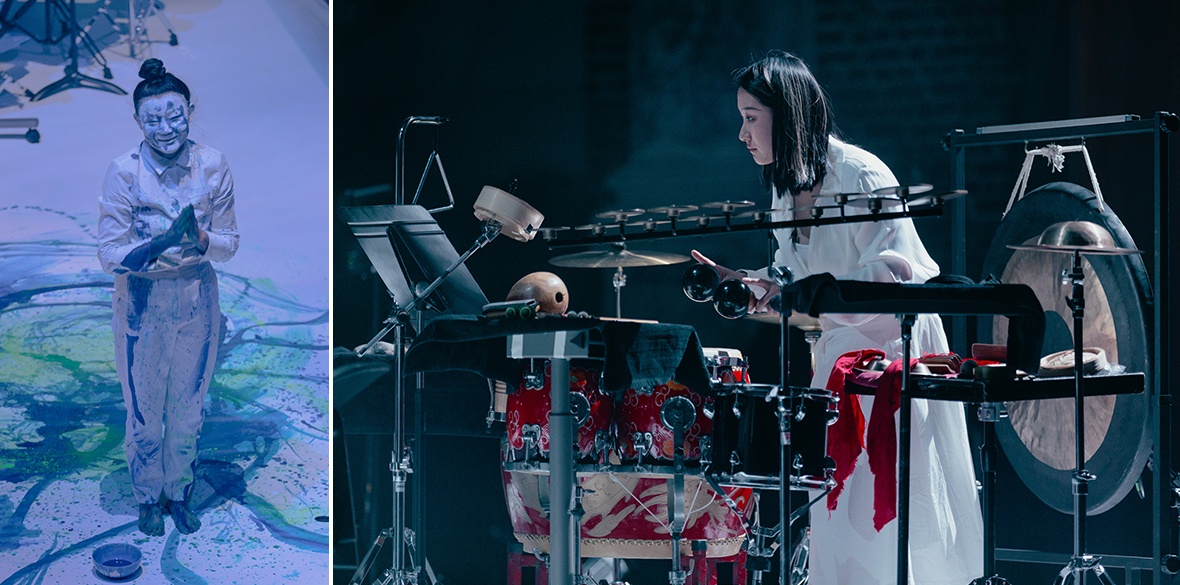This is the last article you can read this month
You can read more article this month
You can read more articles this month
Sorry your limit is up for this month
Reset on:
Please help support the Morning Star by subscribing here
Tangram and Echo Morgan: Nature Echo
LSO St Luke’s, London
TANGRAM are a London-based music collective, founded in 2019, designed to showcase cutting-edge contemporary composition in Chinese and Western culture.
Bringing together music from across four continents, their aims is to present a powerful reflection on the global issue of climate change. Key terms in their launch manifesto include: “To transcend existing systems … to believe anything is possible … to take risks … to push boundaries … to juxtapose cultures and ideas … to put people first … to do it differently every single time … to reinvent ourselves at every turn … to add dimension.”
The St Luke’s concert was performed on the Jerwood Hall floor, under a painting by art director Echo Morgan, that depicted forms of abstract ice melting, fronted by real tree branches painted green. It was atmospherically lit in green, purple, white and blue hues, as the nine pieces were performed.
The performance opened with Dai Fujikura’s composition Hidden Tree, which featured solo cello played by Garwyn Linnell featuring short melodic stabs, suggesting distant hidden atmospheric landscapes. The high notes that split harmonic detail into pizzicato were beautifully interpreted.
Next up Zhenyan Li’s New work that featured piano from Annie Yim, flautist Daniel Shao, and cello and percussion from Beibei Wang, whose physical and demanding playing set the scene.
Her instrument set-up included a mix of Chinese and Western percussion. For the Chinese percussion, three types of Chinese drums were deployed: a dagu big drum, two small paigu, and a flat drum called a biangu, alongside various Peking opera gongs, cymbals, bongos, toms, hi-hats and crash cymbals. In places the piece was busy and jazz-like with an Asian infusion throughout, creating, towards the end, a sense of calm.
Alex Ho’s Plastic Ceremony is a work for a single percussionist, drums and plastic bags. Wang took centre stage, using plastic bags as an instrument played with and on the biang, and occasionally offering vocal whispers and childlike nursery rhyme singing. The performance was wrapped around by a sense of eastern Japanese rhythmic physical drama that concluded with Wang wandering the stage covered in plastic bags, before subsiding into sleep behind Yim’s Yamaha grand piano.
Electra Perivolaris’s Sleeping Warrior is a work for flute and percussion. Sombre, tomb-like and highly atmospheric, haunting harmonised reverb filled the hall. The first half concluded with Chen Yi’s Qi uptempo work for the full ensemble. Pulsing piano, low bass fluidity evoking a Tokyo sunset with all its majestic urban magic and contradictions.
After the interval Vivian Fung’s The Ice is Talking was performed on three blocks of ice played with kitchen knives, bamboo skewers and threaded bolts, and at the end of the piece Wang poured Chinese ink on the ice from a Chinese teacup, all invoking a highly original sound.
Next up was Liza Lim’s Bioluminescence for solo flute. Just prior to the performance a stage manager emerged throwing a selection of mini-LED white ball lights across the floor. Poetic and intense, it set the scene for Shao’s high-drama flute work. His tone and range are a major highlight of the event.
Sun Keting’s Before we Were Ocean for piano and cello featured Western-inspired melodies, romantic and optimistic tones, in places taking referencing influences of Philip Glass and Steve Reich.
The concert concluded with US composer George Crumb’s 20-minute work, Vox Balaenae (Voice of the Whale) written in 1971, inspired by whale songs. The full ensemble returned complete with half paper masks, as instructed by the composer in the score. Sliding cello lines led the work into a mesmerising finale as Morgan joined the musicians on stage, painting the covered stage floor in abstract blue and green lines. At the end, as the players concluded, they took to the front of the stage staring out at the audience in a questioning manner, and they themselves were daubed in paint.
Politics, beauty and art combined into new-found forces that dared the audience to concentrate. Tangram’s courage and ambition has much to offer.











